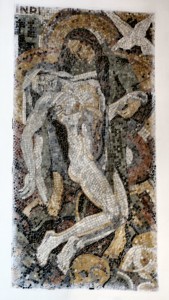The Mercy We Are Called to Live
 When introducing the corporal and spiritual works of mercy in her book, Blessed Are You, author Melanie Rigney writes, “Both types can come free and easy … or hard and challenging” (Franciscan Media, 2016, p. 66). This immediately made me think of the healthy benefits of exercise. I can stroll around the park with the kids, or I can strap on the boxing gloves and go a round with the punching bag.
When introducing the corporal and spiritual works of mercy in her book, Blessed Are You, author Melanie Rigney writes, “Both types can come free and easy … or hard and challenging” (Franciscan Media, 2016, p. 66). This immediately made me think of the healthy benefits of exercise. I can stroll around the park with the kids, or I can strap on the boxing gloves and go a round with the punching bag.
As I read in Melanie’s chapter on mercy, which included Sts. Teresa of Calcutta, Maria Karlowska, and Frances Xavier Cabrini, she brought an important question to mind. How do I approach the responsibility of showing mercy to others in my own life? She did not mean just the common decency we’re called to extend to each other in day to day living with others. But the “words into action, called to be a saint” kind of mercy.
The Works of Mercy remind us that mercy is much more than forgiveness. In totality, these works encourage us to live beyond ourselves. Though we may not all be called to the streets of India, as Saint Teresa of Calcutta was, we are responsible to care for the poorest of the poor—spiritually and physically.
Take for instance praying for the living and the dead. There is a straightforward way to accomplish this work of mercy such as offering the intentions for others during prayer. One of my favorite “free and easy” praying for others actions involves Facebook and Adoration. Before my Eucharistic Holy Hours, I will post on Facebook an image of the Eucharist in a Monstrance and the words “Can I pray for you?” The response this post garners humbles and amazes me. I typically receive 100 or more likes and/or comments indicating a request for prayer. Then, when I am sitting in the chapel before Jesus in the Eucharist, praying for each person and their intention by name, I am overcome with a profound sense of hope and peace. Though the requests often break my heart, I would still place this act in the easy act of mercy category.
A few years ago, after completing a novena to St. Ann for help with a serious financial matter, I felt a spiritual nudge to give back in charity for great blessings received in an answer to this prayer. After a time of prayer, I was inspired to rejoin the ministry of bringing Holy Communion to the homebound. My pastor was happy to have my help—but it would require me to attend the 8 a.m. Mass and rearrange my work schedule. Sacrifice? I didn’t see that coming; I thought it would be at my leisure and on my time. These were inconvenient sacrifices but the “hard and challenging” was yet to come in a most unexpected way.
First, you have to know I am extremely germophobic. Just weeks into this new ministry, I arrived at my assigned assisted-living location and was greeted by a giant note taped to the door, “ENTER AT YOUR OWN RISK. STOMACH BUG EPIDEMIC.”
What?!
The situation was made more difficult because in my hand wasn’t regular Communion but Christmas Communion. How could I not bring them Jesus for Christmas? Christmas was just days away when I was expected to host our family Christmas celebration. It felt selfish to walk into the building and risk getting sick, or worse, exposing my entire family to the bug. Yet, I was holding “Christmas Jesus” and I knew my new friends were looking forward to receiving Communion, which made it seem selfish to walk away.
As my spiritual director always says, “If you are going to trust God, then you need to trust God!” The hard and challenging aspect of this valuable work was trusting God regarding my health for the sake of serving others. When we step out in faith to serve God’s people, we, in essence, become Christ in the world. Even the simplest of tasks can come with obstacles and difficulties; our spiritual muscles are strengthened when we forge through despite them. As in my exercise analogy, the workout that is harder takes more determination and effort. And let’s be honest, the harder workout will produce the greater benefit, too.
In case you are wondering, I did go into the building that morning, and I did not get sick. The smell of Lysol wafting heavily in the air gave me a bit of confidence, but the joy on the face of the first woman quickly told me I made the right choice. I next visited a sweet couple, who had been married for over seventy years. When I was preparing to leave, the wife said, “Jesus will bless you for your kindness.”
Reflecting on that special Christmas, regardless of whether I had become ill or not, the Lord had indeed abundantly blessed me. Abandoning my fears and mustering up my courage to walk through those electronic doors that Christmas elevated my trust in God to a whole new level. The reinforced trust generated in that experience would become the greatest gift I received that year.


